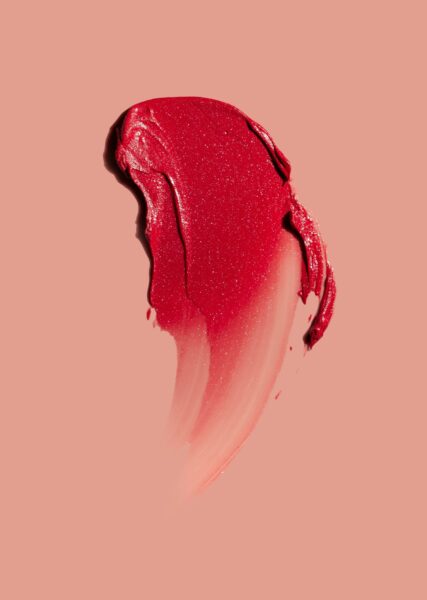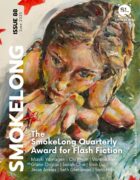My mother haunts my makeup bag. Always be ready, she’d chide as we dressed for mass, reapplying lipstick at red lights and through monsoon rains—once, as my father’s casket was lowered. Death is impatient, Đạt. He won’t wait for you to put your clothes on.
I inherited her contempt for unpreparedness but none of her grace. Truth is, I see my father more in my reflection each day. At night I kneel before the vanity light to contour his features into submission. I want to reach beneath my skin and tear him out. Instead, I exchange scalpel for brush, painting a face over his canvas. This one is mine alone. The best compliment I get is You look nothing like yourself—that I appear as anything but what I am.
The queens at Gingham call me Ever-Virgin. Not fondly—I don’t like to be touched. I don’t drink with them after gigs, don’t let their acrylics graze my hip. Vivian thinks it’s criminal, a body like mine refusing to be shared. You could charge extra, she insists, thumbing through damp dollar bills. For that whole Miss Saigon act you’ve got going on.
But I’ve spent too long carving this form out of my father’s bones. I won’t let anyone pay to undo it. I wasn’t for sale—not how other queens assume when I decline to split a john’s paycheck post-show. You think you’re too good? No. Only that my body hadn’t been mine to sell.
The veteran didn’t ask to touch. He found me after last night’s show while I was scrubbing glitter from my clavicle. A twenty slid under my dressing room door, clipped to a note:
$500 TO DO MAKEUP. NO TALKING.
29619 SMOKEY BOURBON LN, KATY.
I pocketed it—for the money, but more for the absurdity. A man wanting to be painted in silence, as if my mouth were the dangerous part.
*
The drive from Houston to Katy stretched flat and endless, sprawling like something dying. When the veteran answered the door, I noted how his body began its retreat: the catheter snaking from his sweatpants, colostomy bag slung low like an unfashionable purse.
Rules, he began. No questions. No—
No talking.
He led me to a bathroom reeking of antiseptic and talcum. A folding chair faced the mirror, awaiting penance. I unzipped my case.
Sit.
He obeyed.
Up close, his face was a smooth-shaven cadaver’s: liver spots blooming throughout parchment skin, veins mapping age with indigo. Confession without partition.
I cradled his jaw, slathering primer over craters. Contoured to map a woman’s planes onto his masculinity. Unlike a soldier, his eyes followed me with a trust that felt obscene. Like a boy watching his mother tie his shoes, learning.
You Vietnamese? he asked.
I nodded.
Linh was too.
I didn’t ask who Linh was. The photograph on the mantel said enough: a girl, maybe seven, in an áo dài, standing between him and a woman. Her foreignness flared against their whiteness like a struck match. The woman’s smile was tight, the kind my mother wore in photos before the divorce. The girl’s was wide, gap-toothed, doomed. I glued down his brows, tweezing strays.
She’d be your age.
The tweezers slipped. Blood swelled on his lid. I reached for an alcohol swab, but he caught my hand and held it to the scar bisecting his chest.
Ever wished you could cut out the parts that hurt?
I thought of my father facedown in Galveston Bay. The coast guard finding his shrimp boat but never him. My mother, hands steady fixing her lipstick even as they lowered an empty casket knowing it wasn’t a burial without a corpse.
*
He fell asleep when I was doing his eyes. On the sink: a tube of coral lipstick, unused but blooming with age. In the medicine cabinet: estrogen pills beside a Ziploc of baby teeth.
I wandered his house, fingers tracing doilies and painkiller bottles, entering rooms abandoned and maintained. The bedroom was the worst, preserved like a museum. Child’s áo dài hung in plastic. A shrine of porcelain dolls with painted faces arranged in rows like war medals.
I lifted one to lamplight. Bone-white skin. Black hair like mine. White kimono.
She loved them.
I turned, caught between guilt and something harder. He filled the doorway, swallowing the air between us with labored steps. The doll trembled in my hands.
You look like her. When you’re on stage.
His knuckles grazed my cheek—dry, clinical. Not a caress. I felt the potential in them: to kill or to hold.
I’m not her.
Neither am I.
We don’t speak again. The crisp hundred-dollar bills he pressed into my hand felt just withdrawn, still burning with residual warmth. I pocketed the lipstick and photograph before leaving.
Humid night air filled my lungs. The veteran’s gaze followed me still. Through his eyes, I felt my father’s, pressing from within. What refuses burial seeps outward. I carry him like a swallowed bone—his skull in my skull, his eyes in mine, watching.
*
Halfway home, I pulled over to vomit in a Whataburger restroom. Under harsh fluorescents, my reflection disintegrated—makeup cracking along fault lines to reveal Father’s eyes, Mother’s nose. I clawed until skin gave way. Blood mixed with foundation the color of neither parent’s flesh. I knew the truth: the body is no blank canvas. We’re all just carcasses in revision.
Now, I mix his coral with my mother’s Revlon. When I cinch my corset, I think of his colostomy bag. That fragile sack of waste we all carry. At least he has the option to rip it out.
Backstage tonight, Vivian asks, Why’d you do it? The gross old cross-dresser?
I fasten my wig. Same reason you sleep with married men.
Money?
Practice.
She cackles, but the truth is lost on her: I went to learn how to carve a daughter from a corpse. To let someone’s fingers trace my father’s bones and whisper, Stay.
__________________________
“Man Spelt Backwards” is the second-place winner of The SmokeLong Quarterly Award for Flash Fiction 2025.



 The core workshop of SmokeLong Fitness is all in writing, so you can take part from anywhere at anytime. We are excited about creating a supportive, consistent and structured environment for flash writers to work on their craft in a community. We are thrilled and proud to say that our workshop participants have won, placed, or been listed in every major flash competition. Community works.
The core workshop of SmokeLong Fitness is all in writing, so you can take part from anywhere at anytime. We are excited about creating a supportive, consistent and structured environment for flash writers to work on their craft in a community. We are thrilled and proud to say that our workshop participants have won, placed, or been listed in every major flash competition. Community works.